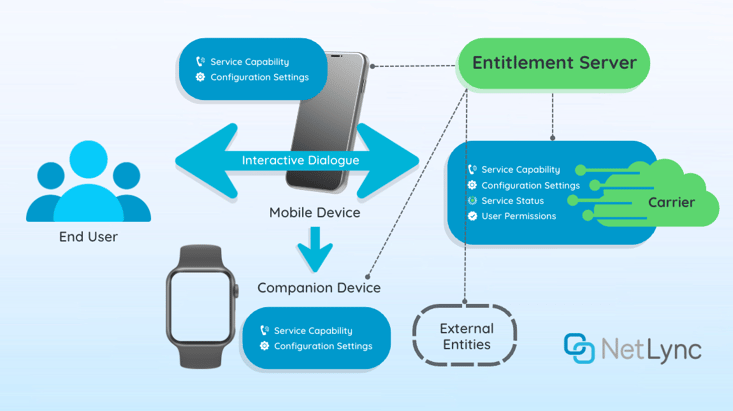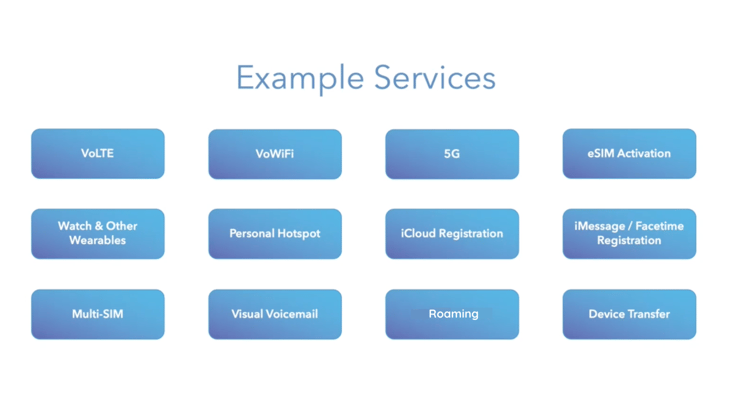Why Carriers Need an Entitlement Server to Enhance the User Experience
Mobile devices have ingrained themselves as an essential part of our interconnected world, seamlessly integrating into the fabric of our lives. In this era of relentless connectivity, it is crucial for carriers to provide comprehensive services that ensure user loyalty. From eSIM transfer and 5G connectivity to watch pairing, these services play pivotal roles in maximising the utility of our mobile companions. Without them, our devices would lose much of their functionality and practicality.
Ensuring a seamless user experience for all customers on a carrier's network is challenging due to diverse device capabilities, configuration settings, and fluctuating service availabilities.
This is where a technology, known as Entitlements, and particularly, an Entitlement Server (managed by the carrier) comes into play. The action of this server is entirely invisible to the end-user, yet via timely interaction between the device itself and carrier and third-party systems, it becomes an all-seeing, all-knowing entity, able to orchestrate the best possible user experience for the customer.
In this blog post, we will explore why carriers need an Entitlement Server and how it contributes to delivering exceptional user experience.

Service Capabilities and Configurations
Every service we use on our mobile devices requires specific capabilities, both on the device itself and within the carrier's network. For example, accessing 5G connectivity requires a device compatible with 5G and a network that supports it. Without matching capability in the device and network, including correct service configuration settings, services may function improperly, or worse still, not work at all. The Entitlement Server ensures that mobile devices are automatically provisioned with the necessary service configurations for carrier services, reducing compatibility issues, enhancing service performance and ultimately providing the best user experience.
Service Status and Availability
In a perfect world, carrier services would run flawlessly, 24 hours a day, 7 days a week. But in reality, some services will go offline on occasion, for various reasons, and if these outages are not managed properly, it can result in a very unsatisfactory experience for the user. For instance, visual voicemail simplifies accessing voice messages, but being one of the more complex services, it may occasionally encounter disruptions. The Entitlement Server informs the device about the current status of this service, allowing it to redirect to an alternative means of voicemail access - thus avoiding a frustrating experience for the user.
User Permissions
Should the carrier wish to, some services may be limited to specific users, perhaps depending on the mobile subscription they have, or if they have passed government identity (eKYC) checks, for example. Other services may be subject to additional fees. The Entitlement Server is enabled to manage such permissions on behalf of the carrier. By seamlessly integrating user permissions, carriers can provide personalised service offerings and prevent unauthorised access to premium features.
Companion Device Synchronisation
With the increasing prevalence of companion devices like smartwatches or tablets, it becomes essential to ensure consistent service capabilities and configurations across all connected devices. The Entitlement Server facilitates communication between the primary device, typically a smartphone, and its companion devices. By sharing relevant information and maintaining synchronisation across devices, the Entitlement Server ensures a cohesive experience across multiple devices.
Signup Processes and Terms and Conditions
Certain services may require users to go through signup processes or accept terms and conditions before they can be enabled. The Entitlement Server facilitates this interactive dialogue between the user and the carrier via the mobile device itself, allowing for a seamless registration process. By automating the necessary procedures, carriers can expedite service activation, reducing user friction and enhancing overall satisfaction.

In conclusion, the implementation of an Entitlement Server by carriers is essential for delivering seamless and exceptional user experiences in the mobile industry. By managing service capabilities and configurations, informing users about service status and availability, handling user permissions, facilitating device synchronisation, and streamlining signup processes, the Entitlement Server plays a pivotal role in enhancing service performance, reducing user friction, and ultimately ensuring customer satisfaction in our interconnected world of mobile devices.
If you are interested to learn more about NetLync's PaaS-based Entitlement Server, please contact us here, our team will get back to you as soon as possible.